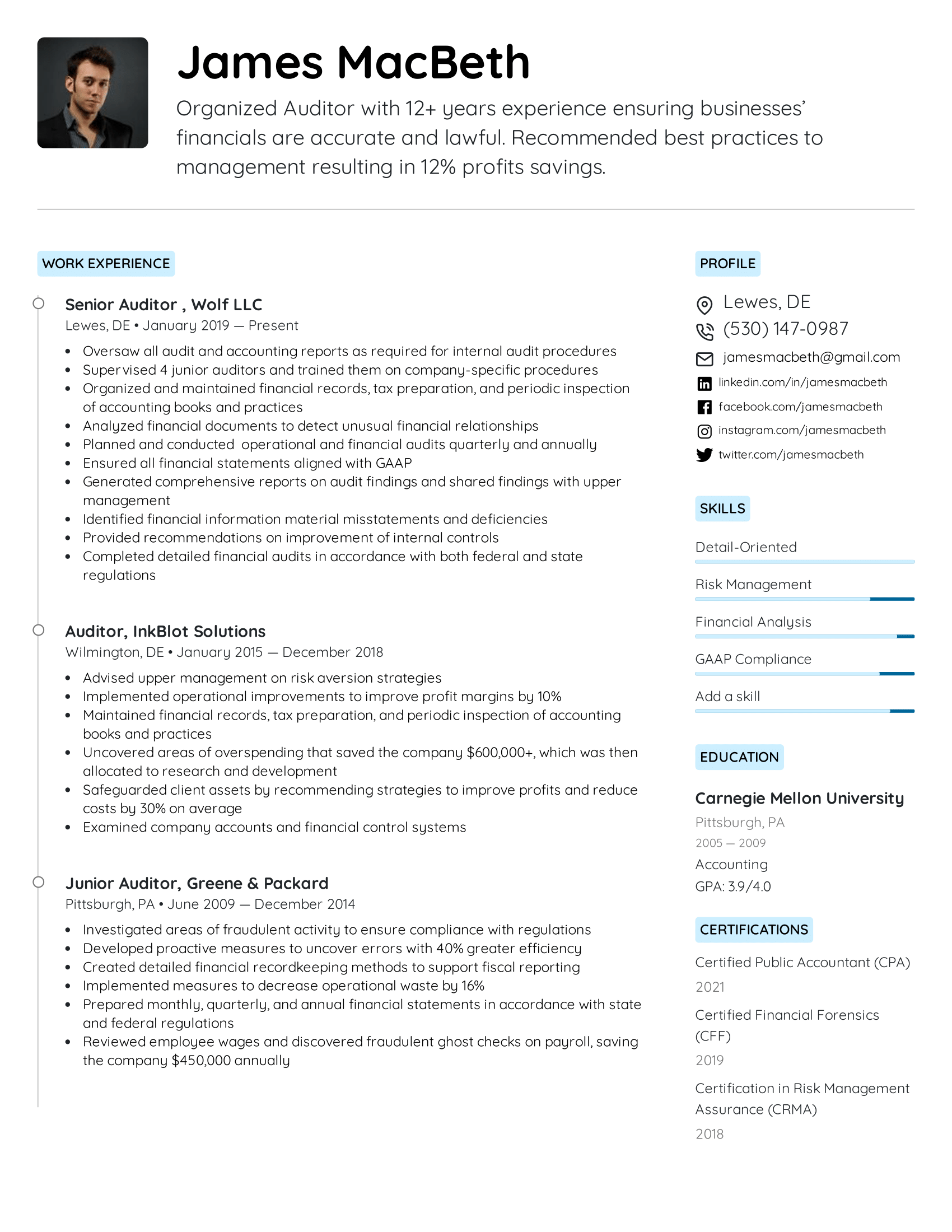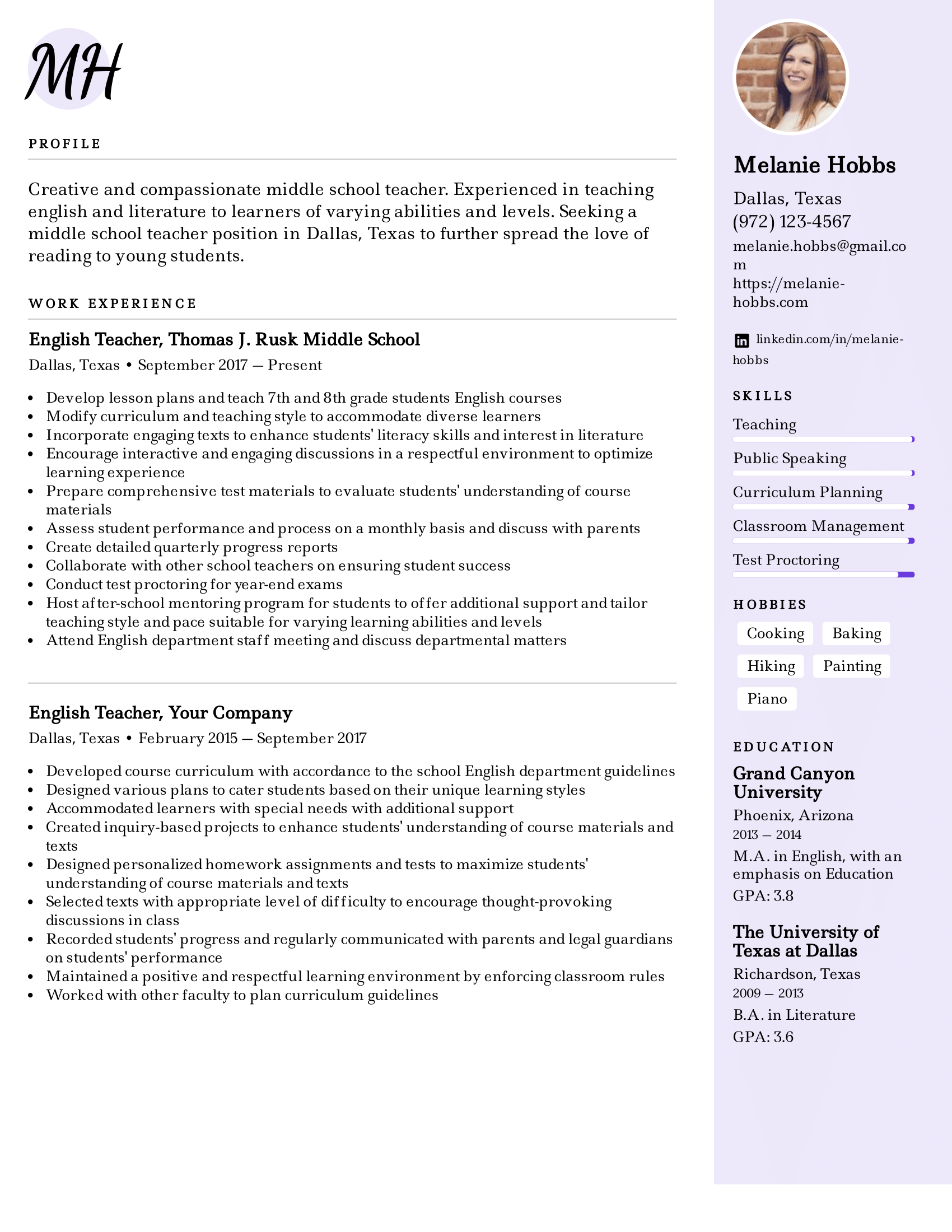Examine your resume with our help and ensure it complies with your future employers’ needs







Auditors are vital to a business economy. They review and verify the accuracy of financial records, ensure that companies comply with tax laws, and search for ways to boost profits.
According to the US Bureau of Labor Statistics, Auditors can make between $80,000 and $130,000 a year. In order to secure that top pay, let us help you craft a resume that will entice even the finickiest of employers.
Let’s get started!
In this article, we’ll discuss the following:
Senior Auditor, Wolf LLC.
Auditor, InkBlot Solutions
Auditor, Greene & Packard
The first step to drafting your resume is deciding which resume format to use. This depends on your career experience and skillset.
You have 3 main options for your resume:
Tip: only include jobs relevant to the position to which you’re applying, so leave out any former jobs that don’t fit. For example, you wouldn’t include your experience as a cashier because it bears little connection to your current occupation and it doesn’t give the employer any useful information about your auditing abilities.
Have headers like “Communication” and “Financial Skills” with their respective skills listed in bullet points below. At the very end, include a brief snapshot of your work history.
Tip: When in doubt, choose the Reverse-Chronological resume format.
For an Auditor, hiring managers want to glance at your resume and get a sense of the following:
The best format for a Career is the Reverse-Chronological resume format. This is because auditing involves practical application of financial knowledge, and employers want to see how you’ve applied this knowledge throughout your work history.
84% of resumes that are rejected are pushed aside because they’re too impersonal. A resume summary can help fix this by showing the recruiter a snapshot of who you are and what you have to offer.
A resume summary is one or two sentences at the top of your paper that summarizes your entire resume. It’s the punch line that gets the resume reviewer wanting to know more.
For an Auditor career, include the following points in your summary
Here is an example of a bad resume summary: Auditor experienced in reviewing financial documents for accuracy.
This is the definition of an auditor, and it doesn’t reveal anything specific about YOU.
Here is an example of a good resume summary: Organized Auditor with 12+ years experience ensuring businesses’ financials are accurate and lawful. Recommended best practices to management resulting in 12% profits savings.
This summary gives a sense of you -- you’re “organized” and have over a decade of experience. It also gives the recruiter a sense of your abilities, notably that you’re adept at saving businesses money.
For more information, checkout our guide on writing a killer resume summary.
The next step to drafting your resume is to list your work experience. This includes the name of your position (e.g., Senior Auditor), the name of the location at which you worked, and the length of time in which you worked.
Furthermore, write your resume experience in a way that anyone in your industry will understand. Don't use company-specific language.
For example, let’s say you worked at a place that called a Form 10-K a “comprehensive form.” Not everyone is going to know what “comprehensive form” means, so it’s best to stick with the common name of Form 10-K, otherwise a hiring manager may not know what you’re talking about, and if the manager is confused, they’re more likely to throw out your resume and move onto the next.
You should also quantify your resume whenever possible. This means adding a number -- such as a dollar amount or percentage -- to your accomplishments. Quantifying your resume gives the hiring manager a more concrete idea of your workplace performance. For example, say that you “supervised 3 junior auditors,” “implemented proactive measures that reduced discrepancies by 20%,” or “saved the business $30,000.”
Tip: One way to quantify your resume is by listing your accomplishments and awards.
For more information on how to format your work experience, check out our guide. Don’t have any work experience? We have a guide for that too!
Skills show the hiring manager what you can do for the company -- without taking up too much space in the “work experience” part of your resume.
There are two types of skills -- soft and hard. “Soft” skills are those that are not quantifiable and are more indicative of your personality. Examples include leadership, problem-solving, and communication. In contrast, “hard” skills are those that are learned through formal education. Examples include computer technology, programming languages, and certifications.
You should include both soft and hard skills on your resume. This shows hiring managers not only that you’re knowledgeable in the financial field, but also that you have desirable qualities like being organized or detail-oriented.
Relevant Skills
If you want a more complete list of skills, read our guide on the proper way to include skills on your resume.
Auditors need at least a bachelor’s degree in accounting, business, economics, or data analytics. It’s also advisable to intern at a public accounting firm during your college years, in order to get some real-world experience with auditing.
Most firms want their auditors to be a licensed Certified Public Accountant (CPA). This requires passing an intense four-part exam and completing state qualifications.
Certifications show employers that you’re expanding on your skills and diversifying your experiences. Not only are you more knowledgeable, but you’re also more employable.
Certification programs for Auditors include:
For more information on certifications, check out our guide on how to include certifications on your resume the right way.
Now it’s time for the fun part -- picking the aesthetics of your resume!
Here at EasyResume, we offer 4 different templates.
Your resume template should reflect the job to which you’re applying. For an Auditor, try a Professional or Simple format.
We’ve done it! Almost.
Now it’s time to get down to business -- actually creating the resume.
Here’s what you need to do:
Start from our resume example to save time, and you’ll soon be back to reviewing financial records galore!
Don't know whether you should write a one-page or two-page resume? Find out when it is appropriate to write a two-page resume and learn how to write it correctly.
Read this how-to guideIn this guide, we will cover everything you need to know about including references on a resume, from how to format them to how to know when they should be included at all.
Read this how-to guideYour work experience is a summary of all your hard work, dedication and achievements over the years. Here's how to do justice to your work history.
Read this how-to guideShowcasing your achievements is what can be the cherry on the cake to help you stand out from the crowd as a top performer and really attract employers.
Read this how-to guideHealthcare is a massive and important industry that contains all sorts of professionals. To land a job in healthcare, you must understand what relevant skills employers are searching for. In this guide, we will cover key healthcare skills to include on your resume and why doing so is so important.
Read this career-advice articleShow off your achievements and highlight your growth by listing your job promotions correctly and catch the eye of the recruiter.
Read this career-advice articleLearn essential strategies to land your first, second, or even fifth internship as a college student.
Read this career-advice articleIf this is your first time creating a resume in Microsoft Word, the process may seem overwhelming. Luckily, this article is here to help! In this step-by-step guide, we will cover how to create an effective resume from start to finish using Microsoft Word.
Read this career-advice article